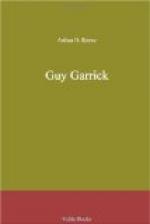We made the trip by railroad, passing the town where the report had come to us before of the finding of the body of Rena Taylor. There was, of course, no one at the station to meet us, and, after wasting some time in learning the direction, we at last walked to Dr. Mead’s cottage, a quaint home, facing the state road that led from Suffern up to the Park, and northward.
Dr. Mead, who had telephoned, admitted us himself. We found Warrington swathed in bandages, and only half conscious. He had been under the influence of some drug, but, before that, the doctor told us, he had been unconscious and had only one or two intervals in which he was sufficiently lucid to talk.
“How did it happen?” asked Garrick, almost as soon as we had entered the doctor’s little office.
“I had had a bad case up the road,” replied the doctor slowly, “and it had kept me out late. I was driving my car along at a cautious pace homeward, some time near two o’clock, when I came to a point in the road where there are hills on one side and the river on the other. As I neared the curve, a rather sharp curve, too, I remember the lights on my own car were shining on the white fence that edged the river side of the road. I was keeping carefully on my own side, which was toward the hill.
“As I was about to turn, I heard the loud purring of an engine coming in my direction, and a moment later I saw a car with glaring headlights, driven at a furious pace, coming right at me. It slowed up a little, and I hugged the hill as close as I could, for I know some of these reckless young drivers up that way, and this curve was in the direction where the temptation is for one going north to get on the wrong side of the road—that is, my side—in order to take advantage of the natural slope of the macadam in turning the curve at high speed. Still, this fellow didn’t prove so bad, after all. He gave me a wide berth.
“Just then there came a blinding flash right out of the darkness. Back of his car a huge, dark object had loomed up almost like a ghost. It was another car, back of the first one, without a single light, travelling apparently by the light shed by the forward car. It had overtaken the first and had cut in between us with not half a foot to spare on either side. It was the veriest piece of sheer luck I ever saw that we did not all go down together.
“With the flash I heard what sounded like a bullet zip out of the darkness. The driver of the forward car stiffened out for a moment. Then he pitched forward, helpless, over the steering wheel. His car dashed ahead, straight into the fence instead of taking the curve, and threw the unconscious driver. Then the car wrecked itself.”
“And the car in the rear?” inquired Garrick eagerly.
“Dashed ahead between us safely around the curve—and was gone. I caught just one glimpse of its driver—a man all huddled up, his collar up over his neck and chin, his cap pulled forward over his eyes, goggles covering the rest of his face, and shrouded in what seemed to be a black coat, absolutely as unrecognizable as if he had been a phantom bandit, or death itself. He was steering with one hand, and in the other he held what must have been a revolver.”




